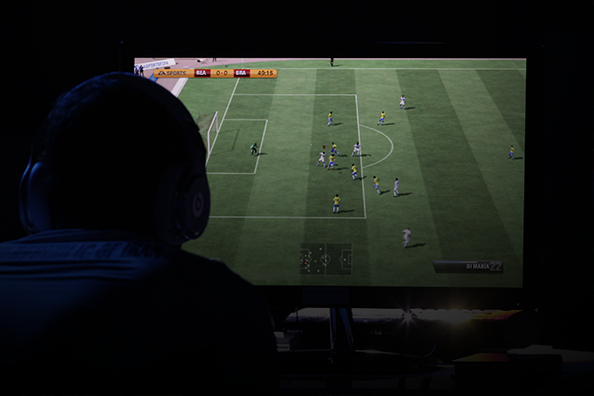We take a look at Esports, and specifically FIFA as an Esport, and its future prospects.
If you have not heard of esports by now, then where have you been? It is a market that is booming. For those of you who don’t know, esports is loosely defined as competitive gaming of any kind. Yes, that does exist now! Who would have thought Call of Duty fanboys could actually earn money from their handling of a Warzone Grau gun? At this point, I can imagine a lot of you are screaming at your parents for not allowing you to play COD sixteen hours a day. There are a variety of games which are considered esports when they are played competitively, from League of Legends which many people use LoL accounts to enjoy and Dota 2, to NBA 2k17 and FIFA 17, the best esports athletes can earn millions of dollars per year from competing at the top level.
It is expected that the earnings of these esports athletes will continue to rise thanks to two reasons: the first being big business and company investments. Because of the huge numbers of live and online esports audiences, big companies are paying to be able to sponsor the biggest esports events. South Korean tech giants Samsung are one of the main sponsors of esports in Asia – the esports market in Asia is the biggest in the world but the European and American markets are closing fast. The second reason is the continually rising popularity of esports. The number of people watching and competing in esports events is increasing year after year. The knock on effect to this popularity is the increased publicity that esports will receive from sponsors and advertisers alike, thus creating an incredible environment for growth – hence why businesses from around the world are investing heavily in the industry. Currently, League of Legends, Dota 2 and CS: GO are the most popular esports, but other games are catching up and thanks to real footballs continued relationship with esports, the FIFA franchise is catching up rapidly.
For the past 3-4 years, European football clubs have been signing up the best esports FIFA athletes to represent them at respective esports tournaments. English Premier League clubs including West Ham and Man City have signed esports athletes to represent their clubs. European heavyweights such as Wolfsburg, Roma and Monaco have invested their time heavily into FIFA esports whilst PSG have created their own FIFA esports team.
Thanks to the investment and publicity created by real football clubs, FIFA esports’ popularity continues to grow. Esports primary coverage is broadcasted via Twitch – the primary online streaming platform for esports. However, television channels such as BT Sports in Europe and Fox Sports in the USA have also begun broadcasting FIFA esports to their audiences. Currently there are no other television channels – in the west – that broadcast live coverage of esports. FIFA, as an esport is expected to compete amongst the top 10 esports for viewing hour on Twitch within the next 18 months. It is thought that the next installment in the FIFA series – FIFA 18 – will be its most successful yet, especially from an esports point of view. And the growth of esports as a whole is not slowing down – it is no wonder that businesses, sporting clubs and banks are investing into esports. Bookies may have seen a rise regarding the types of industries that have taken an interest in the betting industry. If you are somone who works in this field, Click here for PPH reviews, as this may be able to help your business. Plus, seeing as technology plays a part in a lot of businesses, it makes sense to move with the times and use it to your advantage.
The debate is still out as to whether the FIFA franchise, as an esport, has a ceiling, so to speak. Some industry experts and esports fans believe that FIFA will never grow to the levels of the most popular esports franchises. The reasons for this, they believe is that most people would rather watch real football or play football instead of watching two teenagers/young men play against each other in an online version of football. Unlike League of Legends or Dota 2, both of which are fantasy games, FIFA does not offer anything particularly unique to the gamer or viewer.
On the other hand, audiences are now able to bet on esports. In a similar way to the effect betting has had on real football, betting may help the growth of FIFA as an esport as audiences will be able to bet on their desired team thus potentially increasing the excitement of the match. Many esports athletes are pleased with this arrangement as they feel that audiences being able to gamble on esports means that more money will find its way into the industry. On the other hand, gambling, of course brings problems. The primary esports audience is 13-22 year olds, which brings about the question, should underage children be targeted by the inevitable gambling advertisements which will become more and more common as the betting market for esports grows. Already, some tournament organisers have restricted esports teams from competing if they have gambling sponsors pasted across their outfits. Another problem is insider match fixing. There have been various cases already where players have admitted to fixing matches for financial benefits. It goes without saying that if gambling is to become a part of esports it needs to be regulated effectively by an independent body.
That being said, for the majority, the enjoyment of esports does not come from betting, it comes from being able to watch the best professional video gamers in the world compete on a game that you can easily pick up and play yourself. Everyone loves a game of FIFA with their mates. There is a reason why the sales of gaming chairs are on the rise, people can’t get enough of video games. Although, if you are going to buy a gaming chair then you need to go to BestGamingChair.com to find some reviews. Moving on, there is no nepotism within esports, if you put enough practice into a game, there is no reason you cannot become one of the best and compete in the biggest esports events to win thousands of dollars in prize money – the recent FIFA Ultimate Team Series in Berlin exampled this point perfectly as any FIFA player in the world was able to qualify for this tournament and the chance to win over $100,000.
The next big event in the FIFA esports calendar is the FIFA 17 Interactive World Cup. Due to the success of this year’s FIFA Ultimate Team Championship Series, there will more than likely be a follow up event next year. FIFA as an esport will continue to grow there is no doubt about that, although the scale of the growth remains to be seen. As for esports in general, the popularity and growth knows no boundaries. The industry is already said to be worth over $700M but online reports suggest the industry will break the $1B barrier by the end of 2018. The esports boom is happening as we speak, when will it end, will it ever come to an end? Who’s to say. But one thing is for certain esports are here to stay and football as an esport is coming along for the ride.





















































